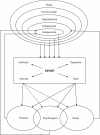A systematic review of the psychological and social benefits of participation in sport for adults: informing development of a conceptual model of health through sport
- PMID: 24313992
- PMCID: PMC4028858
- DOI: 10.1186/1479-5868-10-135
A systematic review of the psychological and social benefits of participation in sport for adults: informing development of a conceptual model of health through sport
Abstract
Background: The definition of health incorporates the physical, social and mental domains, however the Physical Activity (PA) guidelines do not address social health. Furthermore, there is insufficient evidence about the levels or types of PA associated specifically with psychological health. This paper first presents the results of a systematic review of the psychological and social health benefits of participation in sport by adults. Secondly, the information arising from the systematic review has been used to develop a conceptual model of Health through Sport.
Methods: A systematic review of 14 electronic databases was conducted in June 2012, and studies published since 1990 were considered for inclusion. Studies that addressed mental and/or social health benefits from participation in sport were included.
Results: A total of 3668 publications were initially identified, of which 11 met the selection criteria. There were many different psychological and social health benefits reported, with the most commonly being wellbeing and reduced distress and stress. Sport may be associated with improved psychosocial health in addition to improvements attributable to participation in PA. Specifically, club-based or team-based sport seems to be associated with improved health outcomes compared to individual activities, due to the social nature of the participation. Notwithstanding this, individuals who prefer to participate in sport by themselves can still derive mental health benefits which can enhance the development of true-self-awareness and personal growth which is essential for social health. A conceptual model, Health through Sport, is proposed. The model depicts the relationship between psychological, psychosocial and social health domains, and their positive associations with sport participation, as reported in the literature. However, it is acknowledged that the capacity to determine the existence and direction of causal links between participation and health is limited by the cross-sectional nature of studies to date.
Conclusion: It is recommended that participation in sport is advocated as a form of leisure-time PA for adults which can produce a range of health benefits. It is also recommended that the causal link between participation in sport and psycho-social health be further investigated and the conceptual model of Health through Sport tested.
Figures
References
-
- US Department of Health and Human Services. 2008 Physical activity guidelines for Americans. 2008. Available from http://www.health.gov/paguidelines/guidelines/
-
- Physical activity guidelines advisory committee. Physical activity guidelines advisory committee report, 2008. Washington DC: US Department of Health and Human Services; 2008. pp. G8–39.
-
- Mummery K, Schofield G, Caperchione C. Physical activity dose–response effects on mental health status in older adults. Aust N Z J Public Health. 2004;10(2):188–192. - PubMed
-
- Spirduso W, Cronin D. Exercise dose–response effects on quality of life and independent living in older adults. Med Sci Sports Exerc. 2001;10(6):S598–S608. - PubMed
Publication types
MeSH terms
LinkOut - more resources
Full Text Sources
Other Literature Sources
Medical
Miscellaneous



